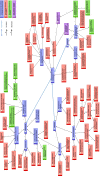Towards an integrated surveillance of zoonotic diseases in Burkina Faso: the case of anthrax
- PMID: 35962327
- PMCID: PMC9372945
- DOI: 10.1186/s12889-022-13878-3
Towards an integrated surveillance of zoonotic diseases in Burkina Faso: the case of anthrax
Abstract
Background: Anthrax is a zoonotic disease that causes frequent outbreaks in livestock and fatal human cases in Burkina Faso. Effective surveillance of this disease calls for the establishment of an integrated surveillance system, in line with the One Health concept. However, despite a strong technical and financial support from international partners, surveillance is still poorly conducted within an integrated approach. Based on stakeholder perspectives, the study has for objective to deepen our understanding of the anthrax surveillance system and to identify the obstacles and levers towards a more integrated approach to anthrax surveillance in Burkina Faso.
Methods: The data was collected from a literature review and interviews with surveillance stakeholders. We first conducted a qualitative descriptive analysis of the data to characterize the surveillance system (programmes, actors, collaboration). In a second step, we conducted a thematic analysis of the informants' discourse in order to identify what represents an obstacle or, conversely, a lever for a more integrated approach to anthrax surveillance.
Results: The surveillance system of anthrax in Burkina Faso includes three programmes (in the livestock, wildlife and human sectors), which involves 30 actors. These sectoral programmes operate almost independently from one another, although some collaborations are existing for the governance and implementation of surveillance activities. Analysis of the discourse of key stakeholders led to the identification of four categories of factors that may influence the implementation of an integrated surveillance system in the country: knowledge; technical, organizational and social capacities; motivation; intersectoral governance.
Conclusions: This study highlights the difficulty of translating One Health governance to the national level and the need to better articulate the visions of all categories of stakeholders. This study also reveals the need to develop specific evaluation systems for integrated policies in order to provide credible evidence of their added value for a better management of zoonotic diseases. Finally, our study underlines the need to act upstream the emergence of zoonoses and allocate more resources to the prevention of zoonoses than to their control.
Keywords: Anthrax; Governance; Integrated; One Health; Surveillance; Zoonoses.
© 2022. The Author(s).
Conflict of interest statement
The authors declare that they have no competing interests.
Figures




Similar articles
-
A participatory approach to move towards a One Health surveillance system for anthrax in Burkina Faso.PLoS One. 2024 Jun 5;19(6):e0304872. doi: 10.1371/journal.pone.0304872. eCollection 2024. PLoS One. 2024. PMID: 38837969 Free PMC article.
-
A qualitative exploratory study using One Health approach for developing an intervention package for elimination of human anthrax in an endemic district of Odisha, India.Indian J Med Res. 2021 Mar;153(3):394-400. doi: 10.4103/ijmr.IJMR_646_21. Indian J Med Res. 2021. PMID: 33907004 Free PMC article.
-
Knowledge, perceptions, and practices around zoonotic diseases among actors in the livestock trade in the Lake Victoria crescent ecosystem in East Africa.Front Public Health. 2024 Jan 8;11:1199664. doi: 10.3389/fpubh.2023.1199664. eCollection 2023. Front Public Health. 2024. PMID: 38264255 Free PMC article.
-
Anthrax outbreaks in the humans - livestock and wildlife interface areas of Northern Tanzania: a retrospective record review 2006-2016.BMC Public Health. 2018 Jan 5;18(1):106. doi: 10.1186/s12889-017-5007-z. BMC Public Health. 2018. PMID: 29304765 Free PMC article. Review.
-
Natural Resource Management Schemes as Entry Points for Integrated Landscape Approaches: Evidence from Ghana and Burkina Faso.Environ Manage. 2018 Jul;62(1):82-97. doi: 10.1007/s00267-017-0866-8. Epub 2017 Apr 20. Environ Manage. 2018. PMID: 28429061 Free PMC article. Review.
Cited by
-
Molecular characterization of an outbreak-involved Bacillus anthracis strain confirms the spillover of anthrax from West Africa.Infect Dis Poverty. 2024 Jan 15;13(1):6. doi: 10.1186/s40249-023-01172-2. Infect Dis Poverty. 2024. PMID: 38221635 Free PMC article.
-
Anthrax meningoencephalitis: A case report.Exp Ther Med. 2024 Nov 1;29(1):9. doi: 10.3892/etm.2024.12759. eCollection 2025 Jan. Exp Ther Med. 2024. PMID: 39563882 Free PMC article.
-
A participatory approach to move towards a One Health surveillance system for anthrax in Burkina Faso.PLoS One. 2024 Jun 5;19(6):e0304872. doi: 10.1371/journal.pone.0304872. eCollection 2024. PLoS One. 2024. PMID: 38837969 Free PMC article.
-
Barriers and enablers to the implementation of one health strategies in developing countries: a systematic review.Front Public Health. 2023 Nov 23;11:1252428. doi: 10.3389/fpubh.2023.1252428. eCollection 2023. Front Public Health. 2023. PMID: 38074697 Free PMC article.
-
Integrated surveillance systems for antibiotic resistance in a One Health context: a scoping review.BMC Public Health. 2024 Jun 27;24(1):1717. doi: 10.1186/s12889-024-19158-6. BMC Public Health. 2024. PMID: 38937706 Free PMC article.
References
-
- Food and Agriculture Organisation A warning for improved prevention, control and heightened awareness. Empres watch. 2016;37:8.
-
- Word Health Organization. Guidelines for the Surveillance and Control of Anthrax in Humans and Animals, 3 rd Edition, PCB Turnbull; 1998. https://apps.who.int/iris/handle/10665/59516.
-
- Centers for Disease Control. [Résumé de l’atelier Prioritisation Des Maladies Zoonotiques Selon L’approche Une Santé Pour Un Engagement Multisectoriel. 2017]. https://www.cdc.gov/onehealth/pdfs/burkinafaso-french-508.pdf. Accessed 2 Feb 2022. Report in French.
Publication types
MeSH terms
LinkOut - more resources
Full Text Sources
Medical

